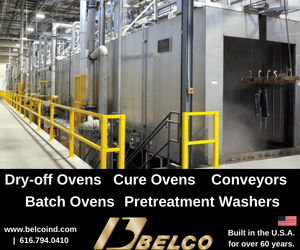Immersion Vs. Autocatalytic Gold Plating
What is the difference between immersion and electroless (autocatalytic) gold? Are the two processes interchangeable?
Q. What is the difference between immersion and electroless (autocatalytic) gold? Are the two processes interchangeable? R.M.
A. The immersion plating process is fairly simple. The substrate is placed in a solution containing a more noble metal, in this case gold. The surface layer of the substrate is displaced by the gold from the solution. You cannot get a very heavy deposit of gold using this process. Typically the deposit will only be a few atoms thick. Why? Once the surface of the substrate is coated with the gold, no more of the substrate surface can be dissolved. Immersion deposits typically do not adhere well to the substrate.
On the other hand, autocatalytic gold plating solutions contain reducing agents. When the substrate is placed in an autocatalytic plating solution and the part suitably catalyzed, the deposition of gold will continue until the part is removed from the solution or the solution is depleted of gold. The gold deposit is much thicker than that obtained from an immersion plating process, and it’s adherence to the substrate is much better.
Autocatalytic gold solutions are relatively new in the world of metal finishing. The granddaddy of these solutions is the electroless nickel plating solutions that are fairly well-known and understood.
The answer to your second question is no, the two processes typically cannot be interchanged. The immersion process is used mostly for decorative purposes while the autocatalytic process is used for specific high-tech applications. The immersion process has been around for many years and is used for plating jewelry findings, low-end gold colored items, etc.
Related Content
-
Troubleshooting Alkaline Zinc
One of the most common problems that can arise when plating with alkaline zinc is an imbalance of brightener in the solution. In this helpful Ask the Expert article, Chad Murphy of Columbia Chemical discusses how different zinc metal concentrations and brightener concentrations can impact efficiency.
-
Innovation in Plating on Plastic
Plating on advanced plastics solution offers improved adhesion, temperature resistance and cost savings.
-
How to Choose Between Sulfate and Chloride-Based Trivalent Chromium
There are several factors to consider when choosing between sulfate and chloride-based baths for trivalent chromium plating. Mark Schario of Columbia Chemical discusses the differences and what platers should keep in mind when evaluating options.
















